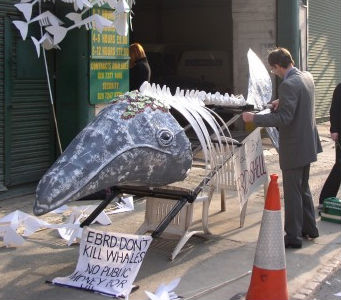Russian environmentalist Dmitry Lisitsyn is one of the six winners of the Goldman Environmental Prize, often referred to as the Nobel Prize for environmentalism.
Having had the privilege to work with Dmitry, Bankwatch witnessed his enduring dedication and indefatigability during the fight to safeguard endangered ecosystems on Sakhalin Island in Russia – a fight that is ongoing for the last two decades in the face of the world’s largest oil and gas projects.
Sakhalin Island, off Russia’s eastern shore, is one of the richest sites in marine biodiversity worldwide and breeding area to a number of endangered species. But, following the discovery of vast oil and gas reserves in the 1980s, the area has been targeted for exploitation by both governments and the biggest energy companies worldwide.
In the early 1990s, two major petroleum projects were initiated on the island: Sakhalin I, led by Exxon, and Sakhalin II, managed by a consortium consisting of Royal Dutch Shell, Mitsui, and Mitsubishi, among others. The European Bank for Reconstruction and Development has been involved in the earliest stages of Sakhalin II development, by offering financial support to Royal Dutch Shell. After almost one decade of involvement the EBRD withdrew from the project when Russian state company Gazprom joined the consortium.
Through all the trials and tribulations of these business ventures, Dmitry and his organisation, Sakhalin Environment Watch, have acted as tough watchdogs of the project, negotiating stricter regulations, cleanup of toxic sludge and an end to dumping waste in the ocean.
They have fought to protect the world’s last one hundred Western Pacific grey whales, threatened by the development. They have worked to safeguard the key salmon fishing area off the island — and the livelihood of tens of thousands of farmers depending on this catch.
Dmitry has also obtained more rights for Sakhalin’s indigenous communities and campaigned to create the Vostochny Wildlife Refuge on Sakhalin Island, which has led to the protection of nearly 67,000 hectares of ancient forest, salmon spawning grounds and the adjacent marine area.
Dmitry’s struggle and successes are an inspiration for us in Bankwatch and we’re celebrating his achievements and the acknowledgment he received with this prize.
“The last wild, untouched salmon rivers, which we are trying to save on our island, are the embodiment of beauty, power and freedom of wild nature. I’m convinced if we would lose them, all our planet would be poorer, because we will never be able to get them back.” – Dmitry Lisitsyn
Notes
This is the second prestigious award within a month for Russian activists contesting ruthless environmental destruction. Evgenia Chirikova in March received the Woman of Courage Award for her efforts to save the Khimki Forest near Moscow from a motorway construction. You can still sign on an international petition asking the french construction company not to participate in the project.
Image:
Dimitry helps put the finishing touches on a whale skeleton used during a mock funeral staged by campaigners during the 2004 EBRD annual meetings in London to protest the bank’s involvement in the Sakhalin II project.
Never miss an update
We expose the risks of international public finance and bring critical updates from the ground – straight to your inbox.
Institution: EBRD
Theme: Energy & climate | Other harmful projects
Location: Russia
Project: Sakhalin II Oil and Gas Extraction, Russia
Tags: biodiversity | extractive industries | fossil fuels | success

